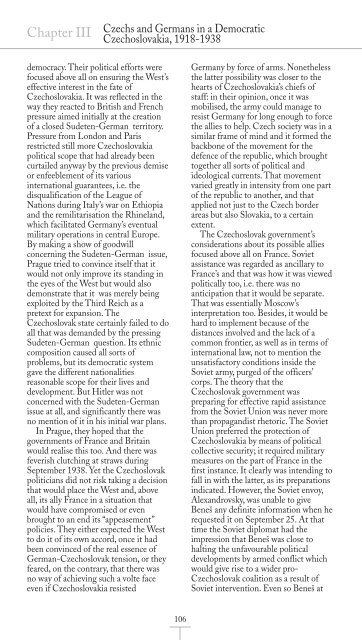the nationality of all inhabitants of the czech provinces and ...
the nationality of all inhabitants of the czech provinces and ...
the nationality of all inhabitants of the czech provinces and ...
You also want an ePaper? Increase the reach of your titles
YUMPU automatically turns print PDFs into web optimized ePapers that Google loves.
Chapter III<br />
democracy. Their political efforts were<br />
focused above <strong>all</strong> on ensuring <strong>the</strong> West’s<br />
effective interest in <strong>the</strong> fate <strong>of</strong><br />
Czechoslovakia. It was reflected in <strong>the</strong><br />
way <strong>the</strong>y reacted to British <strong>and</strong> French<br />
pressure aimed initi<strong>all</strong>y at <strong>the</strong> creation<br />
<strong>of</strong> a closed Sudeten-German territory.<br />
Pressure from London <strong>and</strong> Paris<br />
restricted still more Czechoslovakia<br />
political scope that had already been<br />
curtailed anyway by <strong>the</strong> previous demise<br />
or enfeeblement <strong>of</strong> its various<br />
international guarantees, i.e. <strong>the</strong><br />
disqualification <strong>of</strong> <strong>the</strong> League <strong>of</strong><br />
Nations during Italy’s war on Ethiopia<br />
<strong>and</strong> <strong>the</strong> remilitarisation <strong>the</strong> Rhinel<strong>and</strong>,<br />
which facilitated Germany’s eventual<br />
military operations in central Europe.<br />
By making a show <strong>of</strong> goodwill<br />
concerning <strong>the</strong> Sudeten-German issue,<br />
Prague tried to convince itself that it<br />
would not only improve its st<strong>and</strong>ing in<br />
<strong>the</strong> eyes <strong>of</strong> <strong>the</strong> West but would also<br />
demonstrate that it was merely being<br />
exploited by <strong>the</strong> Third Reich as a<br />
pretext for expansion. The<br />
Czechoslovak state certainly failed to do<br />
<strong>all</strong> that was dem<strong>and</strong>ed by <strong>the</strong> pressing<br />
Sudeten-German question. Its ethnic<br />
composition caused <strong>all</strong> sorts <strong>of</strong><br />
problems, but its democratic system<br />
gave <strong>the</strong> different nationalities<br />
reasonable scope for <strong>the</strong>ir lives <strong>and</strong><br />
development. But Hitler was not<br />
concerned with <strong>the</strong> Sudeten-German<br />
issue at <strong>all</strong>, <strong>and</strong> significantly <strong>the</strong>re was<br />
no mention <strong>of</strong> it in his initial war plans.<br />
In Prague, <strong>the</strong>y hoped that <strong>the</strong><br />
governments <strong>of</strong> France <strong>and</strong> Britain<br />
would realise this too. And <strong>the</strong>re was<br />
feverish clutching at straws during<br />
September 1938. Yet <strong>the</strong> Czechoslovak<br />
politicians did not risk taking a decision<br />
that would place <strong>the</strong> West <strong>and</strong>, above<br />
<strong>all</strong>, its <strong>all</strong>y France in a situation that<br />
would have compromised or even<br />
brought to an end its “appeasement”<br />
policies. They ei<strong>the</strong>r expected <strong>the</strong> West<br />
to do it <strong>of</strong> its own accord, once it had<br />
been convinced <strong>of</strong> <strong>the</strong> real essence <strong>of</strong><br />
German-Czechoslovak tension, or <strong>the</strong>y<br />
feared, on <strong>the</strong> contrary, that <strong>the</strong>re was<br />
no way <strong>of</strong> achieving such a volte face<br />
even if Czechoslovakia resisted<br />
Czechs <strong>and</strong> Germans in a Democratic<br />
Czechoslovakia, 1918-1938<br />
106<br />
Germany by force <strong>of</strong> arms. None<strong>the</strong>less<br />
<strong>the</strong> latter possibility was closer to <strong>the</strong><br />
hearts <strong>of</strong> Czechoslovakia’s chiefs <strong>of</strong><br />
staff: in <strong>the</strong>ir opinion, once it was<br />
mobilised, <strong>the</strong> army could manage to<br />
resist Germany for long enough to force<br />
<strong>the</strong> <strong>all</strong>ies to help. Czech society was in a<br />
similar frame <strong>of</strong> mind <strong>and</strong> it formed <strong>the</strong><br />
backbone <strong>of</strong> <strong>the</strong> movement for <strong>the</strong><br />
defence <strong>of</strong> <strong>the</strong> republic, which brought<br />
toge<strong>the</strong>r <strong>all</strong> sorts <strong>of</strong> political <strong>and</strong><br />
ideological currents. That movement<br />
varied greatly in intensity from one part<br />
<strong>of</strong> <strong>the</strong> republic to ano<strong>the</strong>r, <strong>and</strong> that<br />
applied not just to <strong>the</strong> Czech border<br />
areas but also Slovakia, to a certain<br />
extent.<br />
The Czechoslovak government’s<br />
considerations about its possible <strong>all</strong>ies<br />
focused above <strong>all</strong> on France. Soviet<br />
assistance was regarded as ancillary to<br />
France’s <strong>and</strong> that was how it was viewed<br />
politic<strong>all</strong>y too, i.e. <strong>the</strong>re was no<br />
anticipation that it would be separate.<br />
That was essenti<strong>all</strong>y Moscow’s<br />
interpretation too. Besides, it would be<br />
hard to implement because <strong>of</strong> <strong>the</strong><br />
distances involved <strong>and</strong> <strong>the</strong> lack <strong>of</strong> a<br />
common frontier, as well as in terms <strong>of</strong><br />
international law, not to mention <strong>the</strong><br />
unsatisfactory conditions inside <strong>the</strong><br />
Soviet army, purged <strong>of</strong> <strong>the</strong> <strong>of</strong>ficers’<br />
corps. The <strong>the</strong>ory that <strong>the</strong><br />
Czechoslovak government was<br />
preparing for effective rapid assistance<br />
from <strong>the</strong> Soviet Union was never more<br />
than propag<strong>and</strong>ist rhetoric. The Soviet<br />
Union preferred <strong>the</strong> protection <strong>of</strong><br />
Czechoslovakia by means <strong>of</strong> political<br />
collective security; it required military<br />
measures on <strong>the</strong> part <strong>of</strong> France in <strong>the</strong><br />
first instance. It clearly was intending to<br />
f<strong>all</strong> in with <strong>the</strong> latter, as its preparations<br />
indicated. However, <strong>the</strong> Soviet envoy,<br />
Alex<strong>and</strong>rovsky, was unable to give<br />
Beneš any definite information when he<br />
requested it on September 25. At that<br />
time <strong>the</strong> Soviet diplomat had <strong>the</strong><br />
impression that Beneš was close to<br />
halting <strong>the</strong> unfavourable political<br />
developments by armed conflict which<br />
would give rise to a wider pro-<br />
Czechoslovak coalition as a result <strong>of</strong><br />
Soviet intervention. Even so Beneš at


